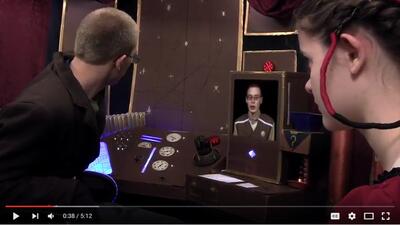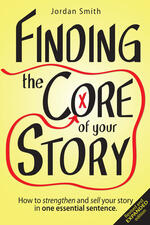"There Are No Escape Pods, Captain" - Jordan Smith On NaNo, Loglines, And Life
Posted by Jason McIntire | Jul 09, 2016
If you recognized the title of this post, then you probably know Jordan Smith - whether you realize it or not. He's one of the people behind Month of the Novel, and also author of the popular writing books Finding The Core of Your Story and, recently, Loglines in the Wild. After reviewing the latter as part of Jordan's launch team, I invited him for an interview and he accepted.
People who think they don't know Jordan Smith might recognize "The Jester" and "The Captain" from that most hilarious YouTube series, Month of the Novel. You directed in addition to acting, and seemed to have a lot of fun doing it. What was your most memorable off-screen moment?

Well, keeping in mind that it's been a few years since making Month of the Novel, I remember two things very well. First, and more generally, the conversations amongst the crew about story and creativity were in some ways the best part of making the series. Spending days at a time in a high-energy creative environment can be exhausting, but there are always great ideas being thrown around by everyone in the room. It's one of my favorite things.
Second, a moment that was sort of intended for on-screen but ended up not quite working: You might remember the fourth episode of season two, where the Princess ends up knitting with a ball of spaghetti and also gets pelted with confetti when the Captain hits the wrong button. What you didn't see was one take where I told Sarah (who played the Princess) to throw the confetti-covered spaghetti at me (as the Captain). It didn't look right on camera, but it did get confetti everywhere and the cast and crew just about died laughing.
Apart from technical excellence (which could always be increased), is there anything you'd change about the two seasons of MotN?
That's a tough question for me to answer because I intentionally try hard to not look back at my previous projects and find things I could fix or redo. I tend to look for things to fix everywhere in life, so I've had to teach myself to let past projects be. I'm much more interested in taking lessons learned from each project and applying them forward to whatever's next. So if I'm allowed to flip the question around like that, I think the lesson I'd apply to the next thing would be to set some limits regarding how many special effects I can call for. We ended up over-committing on season two's effects with the thought that there would be plenty of time to handle them. But in the end, I actually had to hire a couple more effects artists to get the show finished on time, and even then it was very, very close.

And the really big question... will there ever be a third season of MotN?
This is probably the question I get asked most frequently about any of my projects. I've even had somebody send me a pilot episode script for a third season!
Here's the long version: We intentionally stopped after the second season because we felt like we'd taken the concept about as far as it would go without repeating ourselves - and we'd spent nearly a year creating the second season, coming down to the wire at the end to get it out in time. That type of creative pressure squelches the desire to get up and do it all again right away. Also, in the nearly three years since the second season premiered, "normal life" has changed dramatically for most of the people who worked on the show and we're all a lot busier than we were back then. That makes it a lot more difficult for us to spend that kind of time on a project that's fun and we'd all enjoy, but that doesn't pay the bills.
So... I wouldn't say that it's impossible. I've toyed with a couple of concepts for continuing the show, including one I really like that that would be more of a reboot than a third season. But I think to get the ball rolling on more Month of the Novel, I'd have to see a script that takes the series in a fresh direction, coupled with a clear direction for it to give the cast and crew some kind of return on the money we'd spend making it. I haven't seen either of those yet.
Okay, I promise not to ask any more about Month of the Novel. You've also completed a short film called The Balcony, a scriptless movie with an anti-suicide message. What made you decide to take on such an ambitious project, and are you glad you did?
Absolutely, I'm glad I produced The Balcony. A big part of taking on that project was that my friend Kendra Ness, who directed the film, really ran with the message because it was personal for her. So even though that subject matter wasn't something I had a lot of experience with, I was on board with the idea because Kendra was so passionate about it. My role in that project was to facilitate, to clear barriers out of Kendra's way, and to figure out how to achieve her vision with the time and budget we had. That's a lot more technical than some of my previous projects where I was in charge of the creative side as the director, but in a lot of ways the role of the producer is far more rewarding for me. Helping another person realize the images in their head is very cool.

You're the author of a popular writing resource - actually two of them now - on the little-understood subject of loglining. To help readers understand what that is and why it's important, can you give us an example from a well-known work of literature?
It's not quite enough to simply give a logline, so let me start with a typical inept story pitch: "There's a girl whose house gets picked up by a tornado and taken to another world. She can't figure out how to get home. She ends up setting out to find a wizard who can help her, and meets a bunch of misfits along the way who also need the wizard's help. Oh, and there's a wicked witch trying to kill her because when the girl's house landed in the other world, it killed the witch's sister."
Now, contrast that with this logline: "After a tornado carries her house to a magical land, a lonely girl must defeat a wicked witch to get help from the legendary wizard who can send her home."
Straightforward, simple, and memorable for the author. The goal of the logline is to get your potential audience hooked. You can feed them all those other story details once they're on board with the key elements of your concept.
To play the other side for a moment, what would you say to those who think that loglining itself tends to produce a kind of formulaic result? Basically every logline follows the same core structure, right?
There's a core structure, yes. But if you think about it, every well-told story conforms to a core structure as well - beginning, middle, and end at the very least. The point of a logline isn't necessarily to show how different your story is from everything else out there, though that can be part of it. The most valuable part of it, in my opinion, is that it helps you find the high concept part of your story, grab hold of it, and bring it front and center.
High concept, for those who aren't familiar with the term, means that it's an idea that you instantly understand. Most stories that go viral or become bestsellers have a high concept element. For example, the last time I went to the movies, I saw a trailer for a film about a woman who was trapped a short distance from the beach by a shark. You instantly get that. It's not a particularly original story idea, but you can immediately feel the tension and excitement, and your mind is already speculating about where this story can go.
A logline may feel formulaic, but when done well, it pushes the reader's mind into that process of speculation. A great logline will include tantalizing story hints that feed into that speculation even more. And once the high concept is established and the reader is interested, you can fill in the details with a larger summary, which can be as unique as your story.

The basics of your first book, Finding the Core of your Story, get recapped in Loglines in the Wild. If someone reads the second book first - like me - should they go back and read the first one as well?
You're asking the author if he'd like people to buy and read both of his books? Yes! Get both! :-)
More seriously, I tried to make Loglines in the Wild accessible to somebody who hadn't been initiated into the logline craft. The recap in Loglines in the Wild is basically a condensed version of the quick-start chapter in Finding the Core of Your Story, so it barely scratches the surface. I knew that condensed version would be enough for a newbie because when I wrote the original quick-start chapter, I tested it on a group of people who hadn't done loglines before, and they all jumped right in. But they also made me aware of some logline mistakes that I ended up devoting whole chapters to in Finding the Core of Your Story. So the recap is certainly enough to get you going, but there's a lot more in Finding the Core of Your Story and I do recommend that you read it if you're after all the details on the art of loglines.
You've gotten married and become a father in the recent past. Can you tell us one thing you wish someone had told you beforehand?
That's yet another question that's difficult for me to answer. I don't tend to look back and wish I'd known things before events in my life played out. Instead, I think about how what I've learned could help somebody else. (It's a subtle difference, I know.)
So to answer the question in a different way, if I were to give advice to somebody who was getting married or about to become a father, I think it would be this: Remember that success in both marriage and parenting an infant requires enormous flexibility. A way you can show a lot of love to your spouse is by putting their needs over your own. Specifically to husbands, I'd want to offer a reminder that sometimes you must be proactive in meeting needs - don't wait for your wife to ask. Learn her "need cues" and act on them. That goes against a lot of popular thought that men are dense, stupid individuals who are incapable of changing their behavior or having a heart, but my advice works. Especially lately with the baby demanding most of my wife's energy, it's wonderful to see how the light returns to her eyes when I notice a simple need in the making (think something as simple as filling a water glass or taking the baby so she can sit down) and try to meet it before it becomes a crisis for her. And I don't say that as a super dad who always does it right, but those bits of advice are things I aspire to.
I know you're busy at your day job with Simply Charlotte Mason. Apart from keeping up with that, where do you look to go next with film and media?
Well, that day job keeps me on my toes, especially this time of year. My creative life kind of goes on standby from May through September while SCM handles the back-to-school rush that comes with publishing homeschool materials, so here in June as I'm typing this, it's difficult to even think about having the free time to work on another creative project.
That said, there are always other projects waiting in the wings for me. I have a very fun feature film screenplay that I and some of the Month of the Novel team put together even before MotN was thought of. And I'm always looking out for a neat short film idea, or maybe something a little longer. I'd love to try something with a half-hour running time and tackle the challenge of marketing something like that.
At this point, though, it's a lot easier for me to write more books than it is for me to produce film projects. And I have no shortage of book ideas, so I just have to start writing. When the baby lets me have a few minutes to type, that is!
Thanks, Jordan, for being on the blog today - and thanks to the baby for generously allowing you the time for this interview!
Jordan blogs every two weeks at Fix My Story, where you'll find no end of useful writing and publishing tips for the indie author. I read it regularly, and recommend you do too. You can also connect with him on Goodreads, and on Twitter @malfhok.
Comments (1)
Sarah Holman:
Jul 09, 2016 at 03:11 PM
Love this interview! It was a lot of fun!
Add a Comment